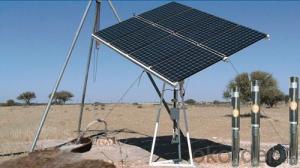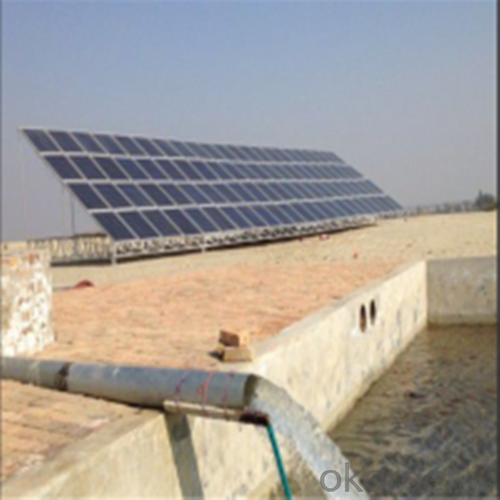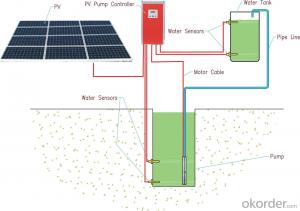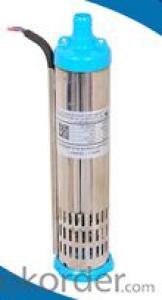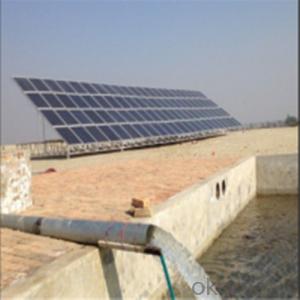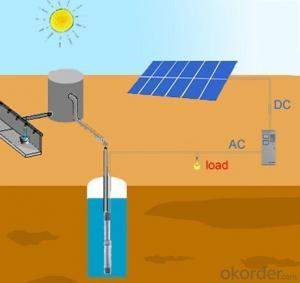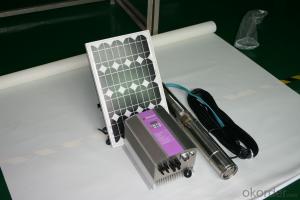Solar Pool Pump - Solar Power Water Pump
- Loading Port:
- Shanghai
- Payment Terms:
- TT OR LC
- Min Order Qty:
- 1 set
- Supply Capability:
- 1000 set/month
OKorder Service Pledge
OKorder Financial Service
You Might Also Like
Solar Pool Pumps Solar Power Pumps Solar Water Pumps
DC solar water pumping system consists of the motor, pump, controller, solar array and some other accessories, such as water level sensor, float switch, etc. Considered that storing water is more efficient than storing electricity, the system is designed to directly drive the pump without battery which can reduce the construction and operating cost and routine maintenance effectively.The PV array consists of multiple solar panels connected in series/parallel, which can supply the whole system as power source by converting the absorbed solar radiation energy to the electrical energy. The pump driven by a brushless DC permanent magnet motor draws water from deep-well or river. The pumped water is then fed into reservoir or water tank, or connected to the irrigation system or fountain system directly.
Advanced Technology
Applications Innovation
The efficiency of DC brushless permanent magnet motor has been increased up to 25% in comparison with traditional asynchronous motor.
Technology Innovation
Stator and rotor are sealed by environment friendly casting resin.Motor insulation resistance can be hold higher than 300MΩfor more than 10 years, which consumedly increased the security and reliability of the submersible motor.
Structure Innovation
Casting resign technology processed stator and rotor as well as the water lubricated bearing make the submersible pump environment friendly.
Feature
High Efficiency & High Reliability
DC Brushless Permanent Magnet Motor
Minimum Maintenance, long Service Life
Environment Friendly Materials, Lubricated Without Oil
Application
Village or Family Water Supply
Animal Drinking Water & Livestock Watering
Garden/Courtyard Irrigation
Swimming Pool
Water Supply for Bivouac or Camping Car
Water Supply for Remote Area
Automatic Control
Operate Automatically, No Need Watching
Maximum Power Point Tracking (MPPT)
Dry-run Protection
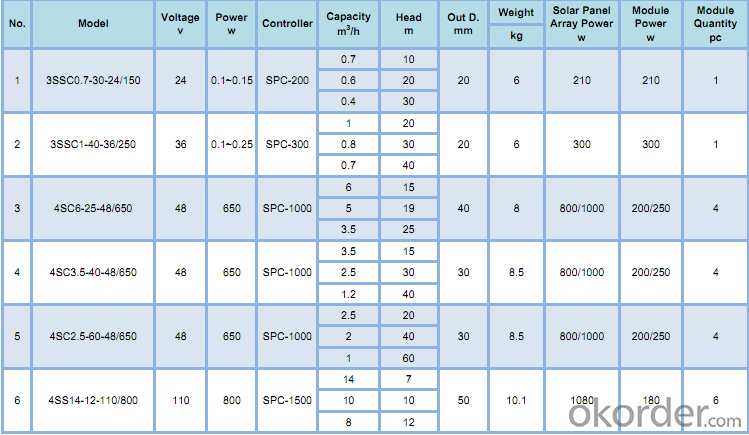
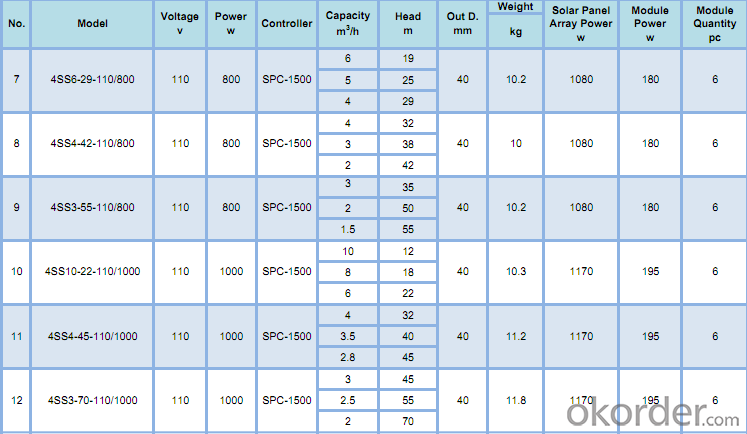
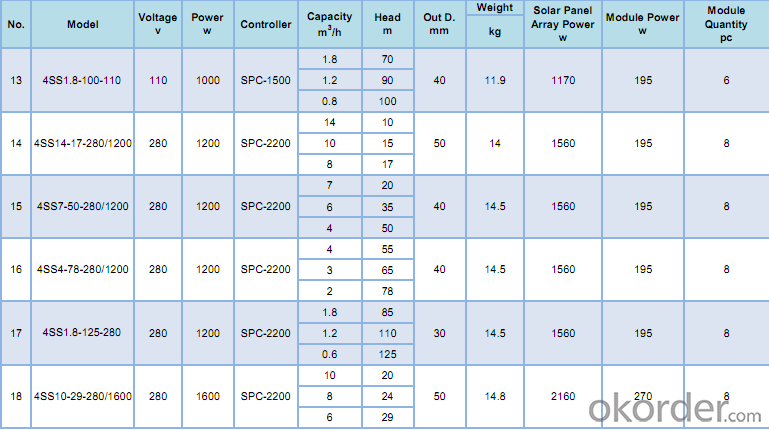
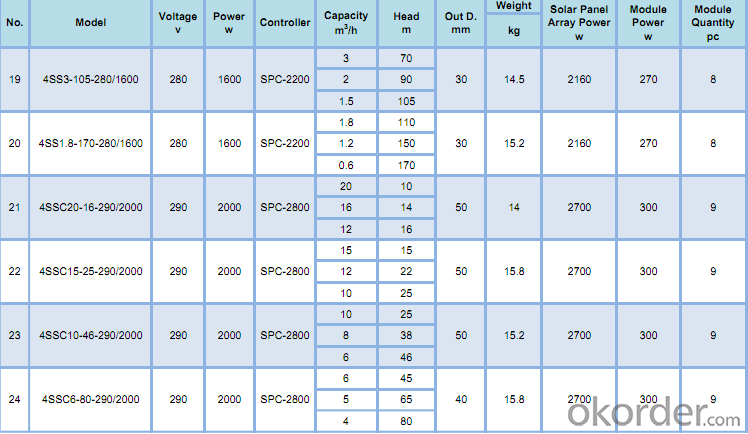
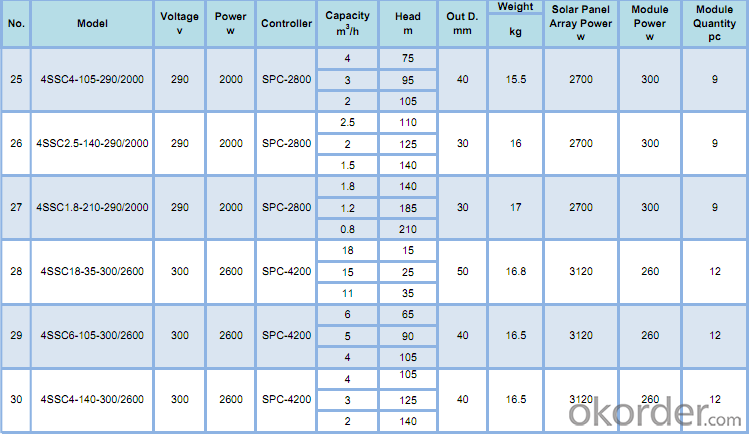
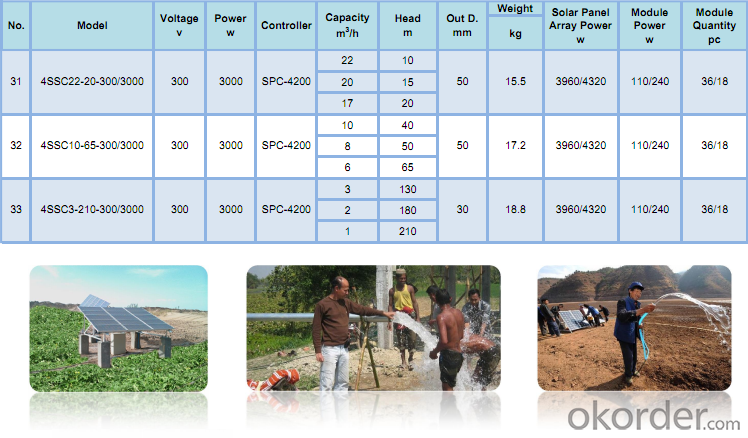
- Q: Can a solar pump be used for water supply in poultry farms?
- Yes, a solar pump can be used for water supply in poultry farms. Solar pumps are an efficient and cost-effective solution for providing water to poultry farms as they use renewable energy from the sun, eliminating the need for electricity or fuel. They can efficiently pump water from wells, rivers, or other water sources to meet the water demands of the poultry farm, ensuring a reliable water supply for the birds' drinking and hygiene needs.
- Q: Can a solar pump be used in areas with limited access to water desalination systems?
- Yes, a solar pump can be used in areas with limited access to water desalination systems. Solar pumps are an efficient and sustainable solution for accessing water from various sources such as rivers, lakes, wells, or even the ocean. While they do not directly desalinate water, solar pumps can be used to extract water from saline sources, and then alternative methods like solar stills or other desalination systems can be employed to treat the water and make it suitable for consumption or irrigation.
- Q: Can a solar pump be used for water supply in refugee camps or temporary settlements?
- Certainly, water supply in refugee camps or temporary settlements can be effectively achieved using solar pumps. These pumps offer a sustainable and economical solution, especially in areas where access to conventional electricity may be limited or unreliable. Solar pumps are powered by solar energy, obviating the need for fuel or electricity. They consist of photovoltaic panels that convert sunlight into electricity, which in turn is used to operate the pump, extracting water from wells, boreholes, or other water sources. The water can be stored in tanks or distributed directly to the community through a network of pipes. Using solar pumps in refugee camps or temporary settlements offers numerous advantages. Firstly, they are environmentally friendly, emitting zero greenhouse gases and reducing reliance on fossil fuels. This not only aids in combating climate change, but also minimizes the risk of fuel shortages or price fluctuations that could disrupt water supply. Secondly, solar pumps are simple to install and maintain. They do not require complex infrastructure or extensive wiring, making them suitable for remote or challenging locations. Additionally, they have a long lifespan and require minimal maintenance, ensuring uninterrupted water supply with minimal downtime. Moreover, solar pumps are highly reliable. As long as there is sufficient sunlight, they can operate consistently, providing a dependable water supply to meet the needs of the refugee camp or settlement. They can also be equipped with battery storage systems to ensure water supply during cloudy periods or at night. Lastly, solar pumps offer long-term cost savings. Although the initial installation costs may be higher compared to traditional pumps, solar pumps have lower operational and maintenance expenses. They do not require fuel, and the only ongoing expenditure is occasional maintenance and replacement of components. In conclusion, solar pumps are an excellent choice for water supply in refugee camps or temporary settlements. They are sustainable, reliable, and cost-effective, providing a consistent source of water without relying on conventional electricity supply. Their installation and maintenance are straightforward, making them an ideal solution for remote and challenging locations.
- Q: How does the size of the solar pump controller affect its performance?
- The size of the solar pump controller does not directly affect its performance. The performance of the solar pump controller depends on its technical specifications, efficiency, and compatibility with the solar pump system. However, it is important to ensure that the controller is appropriately sized to match the power requirements and capacity of the solar pump system for optimal performance.
- Q: Are there any restrictions on the use of solar pumps in certain regions or countries?
- Yes, there can be restrictions on the use of solar pumps in certain regions or countries. These restrictions can vary depending on factors such as local regulations, the availability of sunlight, and the specific needs and requirements of the region. Some areas may have limitations on the installation or use of solar pumps due to environmental concerns, lack of infrastructure, or specific water rights regulations. Additionally, certain countries may have import restrictions or require certifications for solar pump systems to ensure quality and safety standards are met. It is recommended to research and consult with local authorities or experts to understand any restrictions before installing or using solar pumps in a particular region or country.
- Q: Does the balcony wall - mounted solar energy require a circulating pump?
- If your collector is higher than the tank, or because the pipeline climbing and other reasons can not be a natural cycle, it is necessary to increase the circulating pump.
- Q: Can a solar pump be used for water purification?
- Yes, a solar pump can be used for water purification. Solar pumps are often used in combination with water purification systems to provide a sustainable and environmentally friendly solution for accessing clean and safe water. These pumps are powered by solar energy, which means they do not require electricity from the grid or fuel for operation. Solar pumps can be used to extract water from wells, rivers, or other water sources, and then the water can be purified through various methods such as filtration, UV treatment, or chemical disinfection. This combination of solar pumping and water purification can be particularly beneficial in remote or off-grid areas where access to electricity is limited, and it can help improve access to clean water for drinking, cooking, and other domestic or agricultural purposes.
- Q: How big of a solar panel is required for a solar pump?
- The size of a solar panel required for a solar pump depends on various factors such as the power output of the pump, its energy requirements, and the amount of sunlight available. It is recommended to consult with a solar expert or review the pump's specifications to determine the appropriate size of the solar panel needed for optimal performance.
- Q: How does the programming and control system of a solar pump work?
- The programming and control system of a solar pump works by utilizing various components and technologies to ensure efficient and reliable operation. Firstly, the system consists of solar panels that convert sunlight into electrical energy. These panels are usually installed in a location with maximum exposure to sunlight to ensure optimal energy generation. The solar panels are connected to a charge controller, which regulates the voltage and current from the panels to prevent overcharging of the batteries. The control system also includes batteries, which store the generated electrical energy for later use when sunlight is not available, such as during the night or on cloudy days. The batteries are connected to an inverter, which converts the stored DC (direct current) power into AC (alternating current) power, suitable for driving the pump motor. The programming aspect of the system involves setting up timers and sensors to control the pump's operation. For instance, a timer can be programmed to activate the pump during specific times of the day when sunlight is abundant. This ensures that the pump operates when there is sufficient solar energy available. In addition, sensors can be integrated into the system to monitor water levels, pressure, or other relevant parameters. These sensors can provide feedback to the control system, allowing it to adjust the pump's speed or halt operation if certain thresholds are exceeded. This helps in preventing over-pumping or damage to the system. Furthermore, the programming and control system may also incorporate features such as remote monitoring and control. This allows users to monitor the pump's performance, receive alerts on any issues, and adjust settings remotely using a smartphone or computer. Such features enhance convenience and enable proactive maintenance. Overall, the programming and control system of a solar pump combines the power generation capabilities of solar panels, the energy storage capacity of batteries, and intelligent programming to optimize the pump's operation. This results in an efficient, sustainable, and reliable water pumping solution that harnesses the power of the sun.
- Q: Can solar pumps be used for water supply in remote forestry or logging sites?
- Yes, solar pumps can be used for water supply in remote forestry or logging sites. Solar pumps are a reliable and sustainable option for water pumping in remote areas where grid electricity may not be available. They can efficiently extract water from boreholes, wells, or other water sources, providing a consistent water supply for various forestry or logging activities. Additionally, solar pumps require minimal maintenance and operating costs, making them an ideal choice for off-grid locations.
Send your message to us
Solar Pool Pump - Solar Power Water Pump
- Loading Port:
- Shanghai
- Payment Terms:
- TT OR LC
- Min Order Qty:
- 1 set
- Supply Capability:
- 1000 set/month
OKorder Service Pledge
OKorder Financial Service
Similar products
Hot products
Hot Searches
Related keywords
